- Home
- Debra Holland
Mail-Order Brides of the West: Bertha: A Montana Sky Novella (Montana Sky Series) Page 3
Mail-Order Brides of the West: Bertha: A Montana Sky Novella (Montana Sky Series) Read online
Page 3
Darcy shook the paper and let out an ironic laugh. “I spoke too soon. Prudence has invited Bertha to travel to Morgan’s Crossing and run the boardinghouse.” She lowered the letter. “I declare. That Prudence Morgan has me flapping back and forth like a sheet in the wind.”
His eyebrows drew together. “I’m stumped.”
“You’re stumped about Prudence?” She tugged on his arm, and they began to stroll down the street to the church.
“I’m stumped about finding a literary quote to answer your laundry simile.”
Darcy burst into laughter. “Why, I believe that’s a first.” She paused for a minute, searching her mind. “I can’t come up with one, either.” She gazed into his calm eyes that now glinted with amusement and fell even more in love with him. I never thought I’d find someone who understands me, much less loves to talk in quotes as I do. Reaching over, she squeezed his arm. “I hope we can find a good husband for Bertha so she can be as happy with him as I am with you.”
He smiled—the special one reserved only for her—which never failed to warm her insides.
She wrenched her thoughts back to the topic at hand. “I’ll set Trudy and Lina to the task, for they’re the one who know the most people around here. And you know how much they enjoy matchmaking.”
* * *
After church, Darcy and Gideon had only taken a few steps outside when he glanced up and frowned.
Darcy glanced at his unusual expression and followed his gaze, but she didn’t see anything for concern, only a few gauzy clouds layering the deep blue autumn sky. “What?” she asked.
“I haven’t mentioned my unease to you,” he said slowly. “I’m not sure if I even should be troubled.” He tilted his head toward where the Flanigans and Barretts were moving toward each other. “I want to talk to Jonah first…see if he’s noticed…maybe learn if the Indians are concerned….”
Although Darcy wanted to know more, she told herself to be patient. She’d learned when to push her husband to talk and when to leave him be. “You have good instincts, Gideon. You shouldn’t dismiss them.”
He took her elbow and escorted her over to meet up with Jonah and Lina Barrett, who both held the hands of their young son, Adam. Lina, a buxom Italian, wore a rose-colored dress that complimented her olive skin and dark eyes.
The small boy had Jonah’s bottle-green eyes, the olive skin and straight dark hair of his Blackfoot mother, and an infectious smile.
Darcy crouched to his level. “Hello, Adam.” She held out her arms.
His parents released him, and he toddled toward her for a hug.
As always, his sweet affection warmed her. She’d never had experience with small children before and thought she wasn’t very interested in them. Falling in love with Adam had changed her feelings, and now she looked forward to having her own. Darcy rose and smiled at Lina. “I declare, this boy has grown since last Sunday.”
Gideon only had time to ruffle Adam’s hair before the child took off after his favorite redheaded friend, the two small boys carefully watched by some of the older girls.
Lina beamed with maternal pride at Darcy’s compliment and pushed back a corkscrew curl that had come loose from her bun. “A combination of red sauce and love. He’s turned into a little chatterbox, even if I can’t always make out his words.”
Jonah looked on, a proud smile on his face. He had shoulder-length blond hair, a close-cropped beard, and wore a new green shirt his wife had recently made for him.
Although Darcy admired Lina’s sewing ability, she was thankful not to add making clothes to her hard-learned repertoire of domestic skills.
“From Bertha.” Darcy waved the envelope at Trudy and Lina. “And Gideon has some concerns.”
Once again, her husband frowned. “I think we’re heading into a hard winter. I’m already seeing signs with the flora and fauna—birds flying south early, beavers building thicker dams, shaggier coats on the elk and moose. We’ll need to prepare.”
Lina’s brows drew together. “What with my canning and all, I think we have enough laid by to get through ’til spring. We’re butchering the pigs in a few weeks. But what does winter have to do with Bertha?”
Darcy quickly explained about Prudence’s job offer.
Jonah stroked his bearded chin. “I agree with Gid. Your friend Bertha should get here as soon as possible, so she isn’t caught in a snowstorm on the way to the mining camp. And if the winter is bad, Morgan’s Crossing will be isolated and may run out of supplies. They have some crops and livestock, but that’s not their focus. I don’t know how the people would manage in a hard winter.”
“What do you mean by hard?” Lina asked, her concerned gaze moving between the men.
“Frequent storms. Deep snow, lasting well into what should be spring.” Gideon shrugged. “‘The winter will be long and bleak,’” he quietly intoned. “‘Nature has a dismal aspect.’”
Darcy couldn’t place the quote but figured she’d ask him later.
Gideon glanced around. “I want to talk to some others who’ve lived in this land longer than I have.”
Jonah gestured toward where John Carter, one of the most established ranchers in the area, stood talking to a shorter man. “John’s the person to talk to, then. You might not know, but his grandparents were early settlers here. He’s talking to Addison, who owns the neighboring spread. I don’t think you’ve met the man.”
John lifted an acknowledging hand at Jonah’s gesture. He said something to the other man, and they both ambled over. John greeted the six of them with warmth but obviously saw the serious expressions on their faces. “What’s wrong?”
Everyone looked at Gideon.
“I don’t know that anything is…however, I’m speculating that we may have a hard winter if I’m reading nature right.”
John frowned. “I certainly hope that isn’t the case, for the cattle will be a problem. I depend on them being able to free graze, although with the dry summer we’ve had….” He shook his head. “I already bought extra grain and have some hay and alfalfa stored, but not enough for the whole herd through a long winter.” He gazed off in the distance. “I’d like to shrug off what you’re saying and tell myself, ‘We’ll be fine.’ But what if you’re right?”
A murmur went around.
“What if we have a winter like the one in seventy-nine and eighty?” John asked. “Even the trains couldn’t get through.”
“Now you’re just borrowing trouble.” The jibe came from Rancher Addison, a spare man all in brown, from his hat to his hair, tanned skin, eyes, clothing, and boots.
“Maybe so,” John said calmly. “But I’d rather anticipate trouble than have it catch me by surprise.” He turned to Jonah. “I’d be obliged if you’d ride on out to visit your late wife’s family. See if the Indians have the same concerns.”
“Redskins,” Addison scoffed and crossed his arms over his chest.
Jonah stiffened.
John ignored Addison and squinted at the sun. “In the meantime, I’ll set my men to cutting the wild hay near the water courses along the north boundary. The herd won’t go that far in winter, anyway. Can’t hurt to have extra on hand. And I think I’ll order in more grain.”
“Pishaw. Waste of money.” Mr. Addison puckered as if he was about to spit and then seemed to recall the presence of the ladies.
John’s eyes glinted. “Don’t be a fool, Addison,” he said in a sharp tone. “If none of this comes to pass, we’ll end up with fatter cattle come springtime because we’ll have extra feed on hand, instead of running out. Fatter cattle will bring more dollars on the hoof.”
“Bah.” With a dismissive wave of his hand, the rancher turned and walked away.
“Don’t come around begging for feed,” John called after him.
Addison didn’t turn.
Darcy smiled at John with affection. “Mr. Addison’s probably not worried now because he knows he can take advantage of your generosity later. When that man comes c
rawling, you’ll help him out. Look how much time you and your ranch hands put in to help Gideon and I rebuild our house, and we live far away from your place. Furthermore, I suspect it won’t be the first time you’ve come to his aid.”
John let out a slow breath. “Guess I’d better order in an extra large quantity of grain. I might end up supplying the whole dang county.” He shot a look at Jonah. “Find out what your late wife’s family has to say. The Indians brought us a warning in ’80, not that most paid attention. If the tribe agrees with Gideon about a hard winter, then I will personally spearhead efforts to warn everyone in our community.”
Darcy took Lina’s elbow and cut a glance at her in a silent command to speak privately. They eased away from the conversation and out of earshot. Darcy handed Bertha’s letter to Lina.
After Lina finished reading it, she shook her head “I don’t know about this. Bertha thinks Prudence lives in a mansion.”
“We’ll have to disabuse Bertha from any notion of Morgan’s Crossing having mansions and elegant, if dirty, boardinghouses,” Darcy said wryly. “And we need to decide how to advise her. When it comes right down to it, do we trust the new Prudence?”
“I think she’s sincere,” Lina said slowly. “I think we can trust her still to be the old Prudence sometimes and the new Prudence at others. If we caution Bertha, she’ll be prepared.”
“Well…” Darcy thought through the implications. “Bertha was willing to marry a stranger, which, when you think of it, is worse than taking a position working for the Morgans. A job isn’t ‘until death do us part,’ and if Bertha isn’t happy, she can always leave. We’ll let her know she can come stay with any of us.”
Lina’s decisive bob of her head sent the black corkscrew curls dancing around her face. “With the way Bertha can cook and her good-natured personality, she’ll be married in no time. We’ll see to it.” She cast a speculative glance around. “Why, I see ten available men within a hundred feet of us.”
“Bertha might be trapped in Morgan’s Crossing by the winter storms,” Darcy cautioned.
“Spring will come eventually,” Lina said in a practical voice. “We’ll just warn her to bring plenty of food and supplies. I was so grateful for the food I’d brought from home, but the supply was gone in no time. I ended up wishing I’d brought another trunkful. No, two trunks full.”
“Lots of warm clothing, maybe bedding as well,” Darcy added. Those goose down featherbeds she told us her family uses.”
“Look at the bright side.” Lina gave her a mischievous smile. “A hard winter will probably keep Prudence at home and away from Bertha’s boardinghouse.”
“She should bring books,” Darcy added, slipping into her quoting tone. “‘Surely everyone is aware of the divine pleasures which attend a wintry fireside; candles at four o’clock, warm hearthrugs, tea, a fair tea-maker, shutters closed, curtains flowing in ample draperies to the floor, whilst the wind and rain are raging audibly without.’” She changed to her regular voice. “The author Thomas de Quincey doesn’t mention books, which I always thought was because he had too much opium in him at the time he wrote this. After all, the book is called Confessions of an English Opium Eater. Thomas probably meant to wax poetic about books and merely forgot.”
Lina burst out in her earthy laugh. Her eyes danced. “Only you, Darcy Walker. You with your books and your quotations.”
“Books are important. As long as she has something engaging to read, Bertha will manage just fine.”
I hope.
CHAPTER FOUR
Bertha noticed a thin young man several seats ahead of her on the other side of the train car who hadn’t brought food. Nor had she seen him buy any at the train stops. From his shabby, patched clothing, she surmised he didn’t have any money. Since she couldn’t bear to see anyone going hungry, Bertha prepared a packet containing a thick sandwich and half a dozen cookies from the food basket she’d brought. On one of the stops, she’d nerved herself up to walk by the youth and thrust the parcel into his hands.
Wide-eyed, he stammered thanks.
She smiled and hurried back to her seat. To stay and talk would have been uncomfortable for them both, although she would have liked to know where he was going and what he planned to do when he arrived. She hoped he had someone to welcome him—to feed him….
Rocked by the sway of the train, Bertha fell asleep, until a gentle touch on her shoulder made her startle awake. She blinked and stared up at the train conductor. “Oh, hello.”
The portly man, looking official in a green and black uniform, nodded toward the window. “Your stop’s coming up, miss. Best prepare yourself.”
“Thank you,” she murmured, straightening in her seat. She glanced at the watch pinned to her coat, a farewell present from her parents, and was relieved to see the train was on time.
He nodded and moved down the aisle.
Stomach churning, Bertha looked out the window but saw no sign of a town, only golden autumn sunlight slanting over dry prairie grass.
Sleeping at an angle had cricked her neck. Bertha reached up, pulled out two long hatpins, and laid them on her lap. Plucking the small blue straw hat from her head, she waved it back and forth, trying to dislodge the ash and dust from the trip. She moved her shoulders and rolled her head to loosen the kink and rubbed her scalp where the pins had anchored the hat to her hair.
A man across the aisle, who had a thin face framed by bushy sideburns and slicked back thinning hair, watched her gyrations. Leaning forward, he tried to catch her eye.
Embarrassed, she looked away. As she’d done much of the time since leaving St. Louis, Bertha kept her eyes lowered, not wanting to give the man, or anyone else, the excuse to engage her in conversation. Luckily, female passengers had been present in her train car throughout the journey, so she never felt unchaperoned. Right now an elderly pair who looked like sisters sat two seats behind her, and a young husband and wife rode near the front.
She smoothed her hair and pinned on the hat before reaching for the double handled-wicker picnic basket on the seat next to her and lifted it onto her lap. In spite of the meals she’d eaten on the journey, the basket remained heavy. Inside were three types of hard sausage, four apples, and the Mason jar that had originally held apfelsaft, but when she’d finished the apple juice, Bertha had refilled the jar with water. In addition, she still had a loaf of Roggenmischbrot and two-dozen hornishkuchen in a round cookie tin.
Between Rose and Mutti, who’d both crammed tins and waxed-paper wrapped parcels into the basket, she’d traveled with enough food to feed the entire car. Not that she had actually done such a thing, of course. That would have involved initiating conversations with her fellow passengers.
Ten minutes later, the town came in sight, looking just as Lina had described in one of her earlier letters. Bertha leaned toward the window, catching a glimpse of a white church with a steeple and some false-fronted wooden buildings before the train rumbled to a stop.
Thankfully, Bertha enjoyed a better view, because she wasn’t trying to peer through torrents of rain such as Lina had suffered on her arrival. Her heartbeat picked up to match the clatter of the wheels still echoing in her head. Her stomach tightened, making her wish she hadn’t eaten the last of the springerle not an hour ago.
On the platform, she saw Trudy Flanigan in a blue dress and hat. Like Bertha, Trudy was German, with blonde hair and blue eyes. Her friend complained about her corseted waistline not coming near the fashionable eighteen inches, but she looked like a stick in comparison to Bertha chunky silhouette.
Trudy stood next to a dark-haired man who must be her husband and scanned the windows of the train. In her latest telegram, Prudence had said the couple would pick her up and drive her to Morgan’s Crossing.
The sight of a familiar face after days among strangers made her chest pinch. Bertha leaned close to the window and waved.
Trudy’s face lit up. She gave an enthusiastic wave in return, and then grabbed her husban
d’s arm and practically dragged him toward the door of the train car.
Bertha tightened her hand on the handles of the basket, surprised by Trudy’s excitement, for really, the two hadn’t known each other that well. After staying only two weeks at the bridal agency Mrs. Seymour had launched Trudy off to Montana Territory to become Mrs. Seth Flanigan. Of course, we did correspond. The tightness in her stomach eased, replaced by a sense of gratitude for Trudy’s friendship.
She moved up the aisle, nodded farewell to the young man, and lumbered down the stairs. No sooner had her feet touched the planks of the platform than Seth seized her basket and portmanteau.
Trudy threw her arms around Bertha. “I’m so glad you’re here!” She squeezed.
As loving as the Bucholtz family was, they were not physically demonstrative. Bertha had few experiences of hugs—although right before her departure, she’d received one from every adult member of her family. Uncomfortable with Trudy’s embrace, but not wanting to cause offence and because she truly was glad to see her friend, Bertha hugged her back, soaking in the affectionate welcome.
Trudy released Bertha and placed a hand on her husband’s arm. “This is my dear Seth, of whom you’ve heard so much.”
Seth, holding her luggage in each hand, waggled his eyebrows. “All good, of course.”
Bertha raised her head to meet his gaze. He had forceful eyes, gray with a black line around the iris, but when he teased, he looked handsome and approachable. “I’d like to welcome another woman from the Mail-Order Brides of the West Agency to Sweetwater Springs. Too bad you aren’t staying in town.”
Bertha smiled shyly and nodded. “Mr. Flanigan.”
Trudy slipped her hand around Bertha’s arm. “We are not so formal here in Sweetwater Springs. Among friends, we use our given names. Call him Seth.”
From behind came the sound of several thuds. They turned to see men unloading Bertha’s three trunks and a dozen large wooden crates.

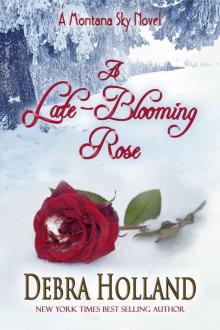 A Late-Blooming Rose: A Montana Sky Series Novel
A Late-Blooming Rose: A Montana Sky Series Novel Mystic Montana Sky (The Montana Sky Series Book 6)
Mystic Montana Sky (The Montana Sky Series Book 6) Harvest of Dreams (The Gods' Dream Trilogy)
Harvest of Dreams (The Gods' Dream Trilogy) Healing Montana Sky
Healing Montana Sky Beneath Montana's Sky: A Montana Sky Novella (The Montana Sky Series Book 0)
Beneath Montana's Sky: A Montana Sky Novella (The Montana Sky Series Book 0) Wild Montana Sky (The Montana Sky Series)
Wild Montana Sky (The Montana Sky Series)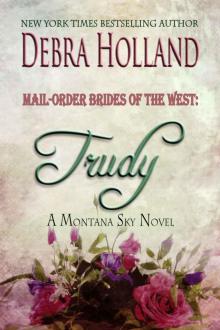 Mail-Order Brides of the West: Trudy (A Montana Sky Series Novel)
Mail-Order Brides of the West: Trudy (A Montana Sky Series Novel) Sower of Dreams (The Gods' Dream Trilogy)
Sower of Dreams (The Gods' Dream Trilogy) An Irish Blessing: The Irish Sisters Trilogy (Montana Sky Series)
An Irish Blessing: The Irish Sisters Trilogy (Montana Sky Series)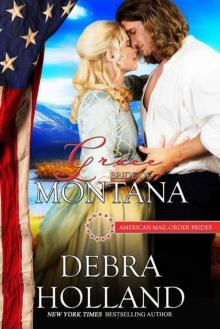 Grace: Bride of Montana (American Mail-Order Bride 41)
Grace: Bride of Montana (American Mail-Order Bride 41) Glorious Montana Sky (The Montana Sky Series)
Glorious Montana Sky (The Montana Sky Series) Montana Sky Christmas: A Sweetwater Springs Short Story Collection
Montana Sky Christmas: A Sweetwater Springs Short Story Collection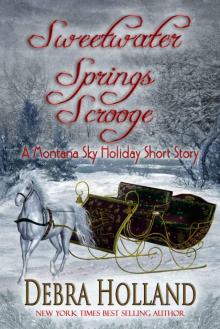 Sweetwater Springs Scrooge: A Montana Sky Holiday Short Story (The Montana Sky Series)
Sweetwater Springs Scrooge: A Montana Sky Holiday Short Story (The Montana Sky Series) MONTANA SKY 07.5: Angel In Paradise
MONTANA SKY 07.5: Angel In Paradise Singing Montana Sky (The Montana Sky Series Book 7)
Singing Montana Sky (The Montana Sky Series Book 7) Painted Montana Sky: A Montana Sky Series Novella
Painted Montana Sky: A Montana Sky Series Novella Reaper of Dreams (The Gods' Dream Trilogy)
Reaper of Dreams (The Gods' Dream Trilogy) A Valentine's Choice: A Montana Sky Series Holiday Novella (The Montana Sky Series)
A Valentine's Choice: A Montana Sky Series Holiday Novella (The Montana Sky Series)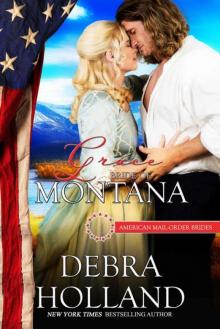 Grace_Bride of Montana
Grace_Bride of Montana Mail-Order Brides of the West: Bertha: A Montana Sky Novella (Montana Sky Series)
Mail-Order Brides of the West: Bertha: A Montana Sky Novella (Montana Sky Series)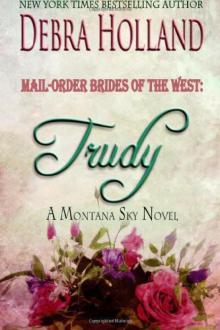 Trudy
Trudy